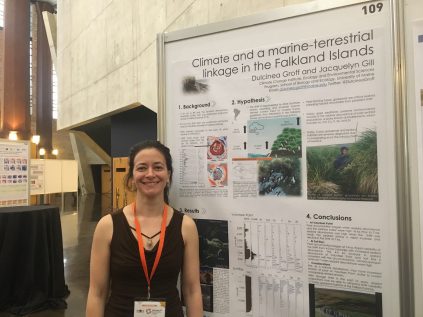Dulcinea Groff
A2C2 IGERT Graduate Fellow
Advisor: Jacquelyn Gill
Bio:
I spent two years learning languages in Spain and Germany prior to earning a BS in Biology (2007) and a MS in Biology (2010) focused on plant evolutionary biology from the University of Central Arkansas. After completing the MS, I worked as a research aide on a project to determine the effects of historical wildfires on food webs of high mountain stream ecosystems of the Sierra Nevada, California, USA. Meanwhile, I also worked at the American Inter-continental University online as an adjunct biology instructor until 2013.
My current position as an IGERT Fellow in the Adaptation to Abrupt Climate Change program and a PhD Candidate in the Ecology and Environmental Sciences program involves research in the Cordillera Blanca of Peru and the Falkland Islands. My primary interests are in paleoecology and paleoclimatology, linkages between marine-terrestrial ecosystems, alpine and island ecology, as well as grassland and fire ecology. More broadly, these interests developed in part through my desire to show others how the past can inform conservation decisions to manage and adapt to a changing world.
Research Area:
Paleoecological and climatological reconstructions over the last 14,000 years provide a useful context to understanding contemporary climate change, as they provide records of natural experiments of past shifts with similar boundary conditions to today. My dissertation work involves 1) identifying abrupt changes in seabirds and mammals populations occupying Tussac grass (Poa flabellata) peatlands in the Falkland Islands by analyzing the concentration of heavy metals associated with marine-derived guano preserved in peat records; 2) examining changes in paleo-vegetation and natural fire frequency through analysis of fossil pollen and charcoal, respectively; and 3) developing an independent climate proxy to reconstruct changes in temperature and humidity from the leaves of Tussac grass found in peat records. These records establish a baseline that will provide ecologists and conservation biologists with a reference to contextualize the status of seabirds and their habitats, and the sensitivity of both to global change.
https://umaine.edu/ecologyandenvironmentalsciences/student-job-dulcinea-groff/


